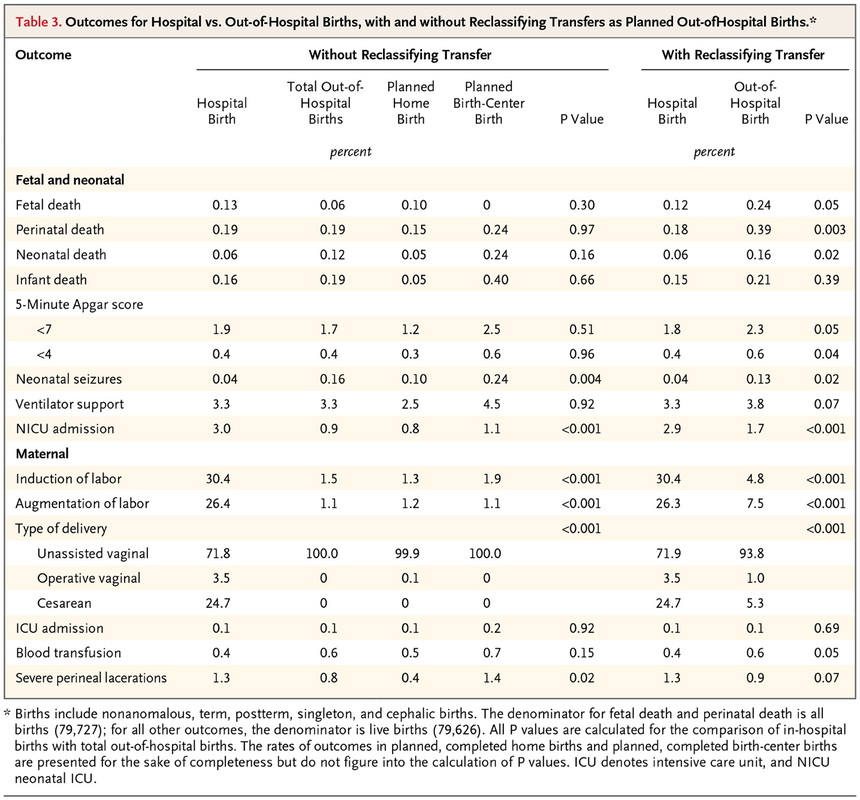
A Dec 2015 study published in the New England Journal of Medicine, titled, Planned Out of Hospital Birth and Birth Outcomes, has been cited as evidence that homebirths carry more risk. I have spoken with a number of MD's over the years who believe homebirth is so dangerous that it should be made illegal.
Both of my children were planned homebirths, although with my first birth, after two nights of labor and no baby (probably because of prior tailbone injury) I ended up transferring into the hospital. The pitocin administered to try to get things moving after the epidural I was given brought labor to a halt, caused my baby's heartbeat to fall. I was literally minutes away from an emergency C-section when my daughter surprised us all and her head popped out. I am convinced, that had I NOT planned to have her at home, where I labored for two nights before going to the hospital, I would have ended up with a C- section. Most medical settings would never have allowed me to labor that long -- which was apparently how long was needed in this case. A C-section would have been devastating for me, not just because recovering from major surgery would have been an unpleasant way to begin motherhood, but also because I believed that C-sections carried long term risks for babies. (And probably more of them than we now know about even now.) For example passing through the birth canal helps the baby establish a healthy microbiome -- critical for proper immune function -- probably reducing the development of allergies. The tight squeezing of the baby's body in a vaginal birth helps to remove amniotic fluid from their lungs and may be a factor in the lower rates of respiratory problems in babies born vaginally.
Because I have met hundreds of homebirth families over the past two decades, who were thrilled with their choice to give birth at home with a lay midwife, and I have also heard some pretty disturbing stories of horrendous planned hospital births, (including one friend who believes her baby's death from a perforated colon was BECAUSE of the hospital's aggressive interventions) I was curious to know more about this study that was being touted as proof that planned homebirth is much riskier, so I got a copy of this article and studied it.
Although I was happy with how medical staff treated me as a home-birther- transferring- into-the-hospital, my midwife told me that our having an MD with clout at the hospital (who had agreed ahead of time to provide our hospital back up) was critical to my positive experience. I know from talking with many other mothers and several midwives, that this is often not the case. Many home birth mothers who transfer into the hospital are treated disrespectfully by staff who believe attempting a home birth is irresponsible, and resent them wanting to have a say in what procedures are or are not used on them. At the very least, such treatment is likely to increase tension, it may even increase the risk of adverse outcomes. An adversarial relationship between patient and staff doesn't help anyone.
So keep all that in mind as I discuss this NEJM article.
The objective of this research was to correct for the bias of previous studies (which had often found homebirth outcomes to be as good or better than hospital.) This study pointed out that previous US research comparing home birth to hospital birth, had compared based upon where the birth actually took place, rather than where it was PLANNED to take place. In other words, if someone planned a birth at home, and then had to transfer to the hospital because things weren't going well -- in past studies that birth (and its possibly bad outcome) had been classified as a hospital birth, which these researchers felt was confounding the data. Recent changes in Oregon in how birth records are entered however, now made it possible to see where births were planned to happen. They looked at about 80,000 births in the state in 2012 and 2013 and compared outcomes based upon where the birth took place, and then reclassified them based upon where they were planned to take place, and once they did this, were able to show a slight increase in perinatal deaths.
However, even the study's authors said this, "Perinatal mortality was higher with planned out-of-hospital birth than with planned in-hospital birth, but the absolute risk of death was low in both settings." This hardly seems like a basis for broad condemnation of home birth especially when you consider the rest of what I have to say.
Before reclassification, homebirths and birth clinic births were shown as separate categories, but after reclassification these were only shown as a combined stat ("out-of-hospital births") And in fact before reclassification, homebirth had significantly less deaths than did birth centers -- so this suggests that after reclassification the birth center stats made "out of hospital" look worse. (see table from the study below.) Also the discussion in this paper explains that births that were planned for the hospital, but ended up happening at home were not included in this study. At first this would seem to make sense to exclude these -- because the assumption is that these labors just happened too fast to get to the hospital, and so don't really reflect the risks of someone planning to birth at home. But I know -- having been part of the homebirth community, that many families planning a homebirth, are unable to find a doctor willing to provide hospital back up. So they PRETEND to go along with the system, and lead their doctor to believe that they plan to give birth in the hospital, so that if they do need to transfer into the hospital, hospital staff, have no idea that they were planning on birthing at home, and think they are just a regular planned hospital birth. If their homebirth does go fine, they simply tell their doctor, "It all happened too fast to get there." We have no idea how many births might have fallen into this category -- but it seems very reasonable, that this exclusion alone could have significantly biased this study against homebirth. Here is a table from the study showing outcomes -- (keep in mind planned homebirthers who pretended that they were planning a hospital birth are not represented here at all.)
Both of my children were planned homebirths, although with my first birth, after two nights of labor and no baby (probably because of prior tailbone injury) I ended up transferring into the hospital. The pitocin administered to try to get things moving after the epidural I was given brought labor to a halt, caused my baby's heartbeat to fall. I was literally minutes away from an emergency C-section when my daughter surprised us all and her head popped out. I am convinced, that had I NOT planned to have her at home, where I labored for two nights before going to the hospital, I would have ended up with a C- section. Most medical settings would never have allowed me to labor that long -- which was apparently how long was needed in this case. A C-section would have been devastating for me, not just because recovering from major surgery would have been an unpleasant way to begin motherhood, but also because I believed that C-sections carried long term risks for babies. (And probably more of them than we now know about even now.) For example passing through the birth canal helps the baby establish a healthy microbiome -- critical for proper immune function -- probably reducing the development of allergies. The tight squeezing of the baby's body in a vaginal birth helps to remove amniotic fluid from their lungs and may be a factor in the lower rates of respiratory problems in babies born vaginally.
Because I have met hundreds of homebirth families over the past two decades, who were thrilled with their choice to give birth at home with a lay midwife, and I have also heard some pretty disturbing stories of horrendous planned hospital births, (including one friend who believes her baby's death from a perforated colon was BECAUSE of the hospital's aggressive interventions) I was curious to know more about this study that was being touted as proof that planned homebirth is much riskier, so I got a copy of this article and studied it.
Although I was happy with how medical staff treated me as a home-birther- transferring- into-the-hospital, my midwife told me that our having an MD with clout at the hospital (who had agreed ahead of time to provide our hospital back up) was critical to my positive experience. I know from talking with many other mothers and several midwives, that this is often not the case. Many home birth mothers who transfer into the hospital are treated disrespectfully by staff who believe attempting a home birth is irresponsible, and resent them wanting to have a say in what procedures are or are not used on them. At the very least, such treatment is likely to increase tension, it may even increase the risk of adverse outcomes. An adversarial relationship between patient and staff doesn't help anyone.
So keep all that in mind as I discuss this NEJM article.
The objective of this research was to correct for the bias of previous studies (which had often found homebirth outcomes to be as good or better than hospital.) This study pointed out that previous US research comparing home birth to hospital birth, had compared based upon where the birth actually took place, rather than where it was PLANNED to take place. In other words, if someone planned a birth at home, and then had to transfer to the hospital because things weren't going well -- in past studies that birth (and its possibly bad outcome) had been classified as a hospital birth, which these researchers felt was confounding the data. Recent changes in Oregon in how birth records are entered however, now made it possible to see where births were planned to happen. They looked at about 80,000 births in the state in 2012 and 2013 and compared outcomes based upon where the birth took place, and then reclassified them based upon where they were planned to take place, and once they did this, were able to show a slight increase in perinatal deaths.
However, even the study's authors said this, "Perinatal mortality was higher with planned out-of-hospital birth than with planned in-hospital birth, but the absolute risk of death was low in both settings." This hardly seems like a basis for broad condemnation of home birth especially when you consider the rest of what I have to say.
Before reclassification, homebirths and birth clinic births were shown as separate categories, but after reclassification these were only shown as a combined stat ("out-of-hospital births") And in fact before reclassification, homebirth had significantly less deaths than did birth centers -- so this suggests that after reclassification the birth center stats made "out of hospital" look worse. (see table from the study below.) Also the discussion in this paper explains that births that were planned for the hospital, but ended up happening at home were not included in this study. At first this would seem to make sense to exclude these -- because the assumption is that these labors just happened too fast to get to the hospital, and so don't really reflect the risks of someone planning to birth at home. But I know -- having been part of the homebirth community, that many families planning a homebirth, are unable to find a doctor willing to provide hospital back up. So they PRETEND to go along with the system, and lead their doctor to believe that they plan to give birth in the hospital, so that if they do need to transfer into the hospital, hospital staff, have no idea that they were planning on birthing at home, and think they are just a regular planned hospital birth. If their homebirth does go fine, they simply tell their doctor, "It all happened too fast to get there." We have no idea how many births might have fallen into this category -- but it seems very reasonable, that this exclusion alone could have significantly biased this study against homebirth. Here is a table from the study showing outcomes -- (keep in mind planned homebirthers who pretended that they were planning a hospital birth are not represented here at all.)
Notice also, the rate of C-sections AFTER reclassification -- was 25% of the planned hospital births, but only 5% of those planning a homebirth. That means that thousands of families planning to have a baby in the hospital ended up having unnecessary C-sections. We don't know how much this increased postpartum depression, or contributed to a new family getting off to a shaky start, or contributed to breast-feeding failures, with long term negative consequences for the health of mother or baby.
There is another possible bias in this study. The authors claim that they controlled for things like gestational diabetes and hypertension -- explaining that these things, separate from the planned place of birth, increase risk and they didn't want them confounding the results. I don't know how they "controlled" for these (were some of these mothers excluded?) -- but I do know that the odds of a previously healthy woman developing hypertension or diabetes during her pregnancy ARE LESS with those planning a home birth, because midwives emphasize and support healthy diet far more than obstetricians, and proper diet can usually prevent these problems. So if they excluded women who became diabetic or developed high blood pressure under the care of their OB -- and then had a bad outcome in part as a result of that condition -- those statistics SHOULD be considered in the equation seeking to understand the risks/benefits of planned home births.
I have always believed that a woman should give birth where ever she feels she is safest. There is unavoidable risk in life and in birth. No one can guarantee a healthy birth outcome. But having freedom means that we are free to chose which risks we would rather be exposed to. I know of great outcomes in hospitals and some tragic ones too. I also know several extraordinary lay-midwives, and have met hundreds of families who have had terrific birth experiences and healthy babies with lay midwives at home. I do not want to criminalize lay midwifery or homebirth. I also do not want to see it further regulated. In the states that have done so, I think there have been negative impacts for women and babies -- because in order to keep their license, midwives become required to practice according conventional medical models -- which is exactly what has caused the home birth movement to grow -- many of us think that model has harms that are not quantified and have risks that we don't want to be forced to accept. We should all be free to choose, and this study -- even taken at face value does not support the assertion that home birth entails significantly more risk over hospital birth.
There is another possible bias in this study. The authors claim that they controlled for things like gestational diabetes and hypertension -- explaining that these things, separate from the planned place of birth, increase risk and they didn't want them confounding the results. I don't know how they "controlled" for these (were some of these mothers excluded?) -- but I do know that the odds of a previously healthy woman developing hypertension or diabetes during her pregnancy ARE LESS with those planning a home birth, because midwives emphasize and support healthy diet far more than obstetricians, and proper diet can usually prevent these problems. So if they excluded women who became diabetic or developed high blood pressure under the care of their OB -- and then had a bad outcome in part as a result of that condition -- those statistics SHOULD be considered in the equation seeking to understand the risks/benefits of planned home births.
I have always believed that a woman should give birth where ever she feels she is safest. There is unavoidable risk in life and in birth. No one can guarantee a healthy birth outcome. But having freedom means that we are free to chose which risks we would rather be exposed to. I know of great outcomes in hospitals and some tragic ones too. I also know several extraordinary lay-midwives, and have met hundreds of families who have had terrific birth experiences and healthy babies with lay midwives at home. I do not want to criminalize lay midwifery or homebirth. I also do not want to see it further regulated. In the states that have done so, I think there have been negative impacts for women and babies -- because in order to keep their license, midwives become required to practice according conventional medical models -- which is exactly what has caused the home birth movement to grow -- many of us think that model has harms that are not quantified and have risks that we don't want to be forced to accept. We should all be free to choose, and this study -- even taken at face value does not support the assertion that home birth entails significantly more risk over hospital birth.


